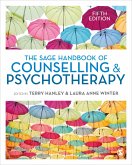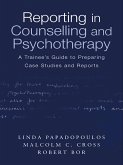The SAGE Handbook of Counselling and Psychotherapy (eBook, ePUB)
Redaktion: Hanley, Terry; Winter, Laura Anne
57,95 €
57,95 €
inkl. MwSt.
Sofort per Download lieferbar

29 °P sammeln
57,95 €
Als Download kaufen

57,95 €
inkl. MwSt.
Sofort per Download lieferbar

29 °P sammeln
Jetzt verschenken
Alle Infos zum eBook verschenken
57,95 €
inkl. MwSt.
Sofort per Download lieferbar
Alle Infos zum eBook verschenken

29 °P sammeln
The SAGE Handbook of Counselling and Psychotherapy (eBook, ePUB)
Redaktion: Hanley, Terry; Winter, Laura Anne
- Format: ePub
- Merkliste
- Auf die Merkliste
- Bewerten Bewerten
- Teilen
- Produkt teilen
- Produkterinnerung
- Produkterinnerung

Bitte loggen Sie sich zunächst in Ihr Kundenkonto ein oder registrieren Sie sich bei
bücher.de, um das eBook-Abo tolino select nutzen zu können.
Hier können Sie sich einloggen
Hier können Sie sich einloggen
Sie sind bereits eingeloggt. Klicken Sie auf 2. tolino select Abo, um fortzufahren.

Bitte loggen Sie sich zunächst in Ihr Kundenkonto ein oder registrieren Sie sich bei bücher.de, um das eBook-Abo tolino select nutzen zu können.
The SAGE Handbook of Counselling and Psychotherapy is the most comprehensive and accessible introduction to the field of counselling and psychotherapy. This handbook supports all levels of training and modalities, providing an essential entry point to theory, practice and research.
At over 600 pages and with more than 100 contributions from leading authors in the field, this Fifth Edition brings together the essentials of counselling and psychotherapy theory, research, skills and practice. Each chapter includes a Further Reading section and case studies. Now updated to include the latest…mehr
- Geräte: eReader
- mit Kopierschutz
- eBook Hilfe
- Größe: 9.22MB
Andere Kunden interessierten sich auch für
![The SAGE Handbook of Counselling and Psychotherapy (eBook, ePUB) The SAGE Handbook of Counselling and Psychotherapy (eBook, ePUB)]() The SAGE Handbook of Counselling and Psychotherapy (eBook, ePUB)57,95 €
The SAGE Handbook of Counselling and Psychotherapy (eBook, ePUB)57,95 €![Psychodynamic Counselling in Action (eBook, ePUB) Psychodynamic Counselling in Action (eBook, ePUB)]() Michael JacobsPsychodynamic Counselling in Action (eBook, ePUB)71,95 €
Michael JacobsPsychodynamic Counselling in Action (eBook, ePUB)71,95 €![Counselling Young People (eBook, ePUB) Counselling Young People (eBook, ePUB)]() Louise PorterCounselling Young People (eBook, ePUB)41,95 €
Louise PorterCounselling Young People (eBook, ePUB)41,95 €![Reporting in Counselling and Psychotherapy (eBook, ePUB) Reporting in Counselling and Psychotherapy (eBook, ePUB)]() Linda PapadopoulosReporting in Counselling and Psychotherapy (eBook, ePUB)33,95 €
Linda PapadopoulosReporting in Counselling and Psychotherapy (eBook, ePUB)33,95 €![The SAGE Handbook of Mentoring (eBook, ePUB) The SAGE Handbook of Mentoring (eBook, ePUB)]() The SAGE Handbook of Mentoring (eBook, ePUB)100,95 €
The SAGE Handbook of Mentoring (eBook, ePUB)100,95 €![Critical Thinking in Counselling and Psychotherapy (eBook, ePUB) Critical Thinking in Counselling and Psychotherapy (eBook, ePUB)]() Colin FelthamCritical Thinking in Counselling and Psychotherapy (eBook, ePUB)46,95 €
Colin FelthamCritical Thinking in Counselling and Psychotherapy (eBook, ePUB)46,95 €![Chronic Sorrow (eBook, ePUB) Chronic Sorrow (eBook, ePUB)]() Susan RoosChronic Sorrow (eBook, ePUB)40,95 €
Susan RoosChronic Sorrow (eBook, ePUB)40,95 €-
-
-
The SAGE Handbook of Counselling and Psychotherapy is the most comprehensive and accessible introduction to the field of counselling and psychotherapy. This handbook supports all levels of training and modalities, providing an essential entry point to theory, practice and research.
At over 600 pages and with more than 100 contributions from leading authors in the field, this Fifth Edition brings together the essentials of counselling and psychotherapy theory, research, skills and practice. Each chapter includes a Further Reading section and case studies. Now updated to include the latest research and developments, and with new content on online counselling and working with difference and diversity, it is the most comprehensive and accessible guide to the field for trainees or experienced practitioners.
Sections cover:
-Counselling and psychotherapy in context
-Social justice and intersectionality
-Core therapeutic and professional skills
-What do people come to therapy for?
-Theories and approaches
-Lifespan, modalities and technology
-Settings.
At over 600 pages and with more than 100 contributions from leading authors in the field, this Fifth Edition brings together the essentials of counselling and psychotherapy theory, research, skills and practice. Each chapter includes a Further Reading section and case studies. Now updated to include the latest research and developments, and with new content on online counselling and working with difference and diversity, it is the most comprehensive and accessible guide to the field for trainees or experienced practitioners.
Sections cover:
-Counselling and psychotherapy in context
-Social justice and intersectionality
-Core therapeutic and professional skills
-What do people come to therapy for?
-Theories and approaches
-Lifespan, modalities and technology
-Settings.
Dieser Download kann aus rechtlichen Gründen nur mit Rechnungsadresse in A, D ausgeliefert werden.
Produktdetails
- Produktdetails
- Verlag: SAGE Publications
- Erscheinungstermin: 2. Februar 2023
- Englisch
- ISBN-13: 9781529785869
- Artikelnr.: 68346135
- Verlag: SAGE Publications
- Erscheinungstermin: 2. Februar 2023
- Englisch
- ISBN-13: 9781529785869
- Artikelnr.: 68346135
- Herstellerkennzeichnung Die Herstellerinformationen sind derzeit nicht verfügbar.
Counselling and Psychotherapy in Context
What are counselling and psychotherapy? - Terry Hanley
The social and political context of counselling and psychotherapy - Laura Anne Winter
What do people come to counselling and psychotherapy for? - Terry Hanley
What are the training routes in counselling and psychotherapy? - Laura Anne Winter and Terry Hanley
Where do counsellors and psychotherapists work? - Laura Anne Winter and Terry Hanley
Social justice and intersectionality
Intersectionality, power & privilege - Dwight Turner
Age - Léonie Sugarman
Counselling and psychotherapy in the context of the climate and environmental crisis - Martin Milton
Disability - Esther Ingham
Gender - Sam Hope
Neurodivergence - Lesley Dougan
Religion and Spirituality - Cemil Egeli and William West
Race, culture and ethnicity - what is your story? - Ohemaa Nkansa-Dwamena and Yetunde Ade-Serrano
Social Class - Liz Ballinger
Sexuality - Silva Neves and Dominic Davies
Core therapeutic and professional skills
Contracting and Therapeutic Beginnings - India Amos
The Client-Therapist Relationship - William B. Stiles
Assessment - Biljana Van Rijn
Risk: Assessment, Exploration and Mitigation - Andrew Reeves
Formulation - Lucy Johnstone
Using Outcome and Process Measures - Julia Lyons
Confidentiality, recordkeeping, and notetaking - Gabriel Wynn
Working with Interpreters - Rachel Tribe and Claire Marshall
Therapeutic Middles - India Amos
Therapeutic Endings - India Amos
Personal and Professional Development - Chris Rose
Clinical Supervision - Mary Creaner
Ethics in Practice - Linda Finlay
Complaints: Learning, prevention, and procedures. - Clare Symons
Therapy and the law - Peter Jenkins
Mental health law - Sobhi Girgis
Integrating Research and Practice - John McLeod
Leadership: therapists as leaders - Daisy Best and Helen Nicholas
Social media and professionalism - Julie Prescott and Chathurika Kannangara
Knowledge of psychopharmacology - Anne Guy
Critical thinking skills in counselling and psychotherapy - Colin Feltham
What do people come to therapy for?
Adult sexual violence: rape and sexual assault - Ishba Rehman
Alcohol-related difficulties - Mani Mehdikani, Julie Scheiner & Loren Whyatt
Anxiety and Panic - Steven Barnes, Julie Prescott, and Jerome Carson
Bereavement and Loss - Edith Maria Steffen and Evgenia (Jane) Milman
Chronic physical health problems - Soha Daru
Counselling for drug-related problems - Tony White
Depression - Denis O'Hara
Eating disorders - Gabriel Wynn
Hearing Voices - Joachim Schnackenberg
Low self-esteem - Soha Daru
Managing stress - Stephen Palmer and Rowan Bayne
Obessive Compusive Disorder - Tracie Holroyd
Personality disorders - Julia Lyons
Phobias - Charlotte Conn, Aashiya Patel and Julie Prescott
Post-Traumatic Stress Disorder - Divine Charura and Penn Smith
Sex and Relationship Problems - Cate Campbell
Sexual abuse in childhood - Rosaleen McElvaney
Suicide and self-harm - Andrew Reeves
Working with survivors of domestic violence - Christiane Sanderson
Theories and approaches
Acceptance and Commitment Therapy - John Boorman, Eric Morris and Joe Oliver
Attachment-based psychoanalytic psychotherapy - Mark Linington and Victoria Settle
Cognitive analytic therapy - Claire Pollitt
Cognitive behavioural therapy - Dr Heather Sequeira and Dr Jill Mytton
Compassion focused therapy - Sunil Lad and Jenika Patel
Dialectical Behaviour Therapy - Michaela Swales and Christine Dunkley
Ecotherapy - Nick Totton
Eye movement desensitisation and reprocessing (EMDR) - Catherine Kerr and Liz Royle
Emotion-focused therapy - Ladislav Timulak
Existential therapy - Emmy van Deurzen
Feminist Therapy - Liz Ballinger
Gestalt Therapy - Faisal Mahmood and Emma Flax
Gender, Sex and Relationship Diversity Therapy - Dominic Davies and Silva Neves
Interpersonal Psychotherapy - Elizabeth Robinson and Catherine Edmunds
Jungian Analytical Psychology - Ruth Williams
Lacanian Therapy - Lionel Bailly
Mindfulness Based Cognitive Therapy - Adam J. Scott and Kate Adam
Multimodal Therapy - Stephen Palmer
Narrative Therapy - Fiona Stirling and John McLeod
Person-Centred Therapy - Keith Tudor
Personal Construct Therapy - David Winter
Pluralistic Therapy - Christine Kupfer, John McLeod and Mick Cooper
Psychoanalytic Therapy - Jessica Yakeley
Psychodynamic Interpersonal Therapy - Richard J. Brown, Sara Bardsley and Vanessa Herbert
Psychodynamic Therapy - Dwight Turner
Schema Therapy - Konstantina Kolonia and Helen Kyritsi
The Skilled Helper Model - Val Wosket and Peter Jenkins
Solution-Focused Brief Therapy - Guy Shennan
Transactional Analysis - Charlotte Sills and Keith Tudor
Lifespan, modalities, and technology
Counselling children - Kathryn Geldard and Rebecca Yin Foo
Counselling young people - Kathryn Geldard and Rebecca Yin Foo
Counselling older people - Anne Hayward and Ken Laidlaw
Couple Therapy - Cate Campbell
Systemic family therapy - Rudi Dallos
Group therapy - Stephen Paul
Electronically Delivered Text Therapy - Kate Anthony and Stephen Goss
Videoconferencing Therapy - Zehra Ersahin
Counselling by Telephone - Maxine Rosenfield
Wider uses of technologies in therapy - Stephen Goss, DeeAnna Merz Nagel, and Kate Anthony
Settings
Working in Schools - Shira Baram
Working in Colleges and Universities - Kirsten Amis
Working with the Media - Elaine Kasket
Working with neuroscience and neuropsychology - David Goss
Private practice - Gareth Williams
Working in primary care - Zubeida Ali and Satinder Panesar
Short Term Therapy - Alex Coren
Workplace Therapy - Charlotte Conn and Aashiya Patel
Working in Forensic Settings - Jenika Patel and Sunil Lad
Coaching - Zsófia Anna Utry and Stephen Palmer
What are counselling and psychotherapy? - Terry Hanley
The social and political context of counselling and psychotherapy - Laura Anne Winter
What do people come to counselling and psychotherapy for? - Terry Hanley
What are the training routes in counselling and psychotherapy? - Laura Anne Winter and Terry Hanley
Where do counsellors and psychotherapists work? - Laura Anne Winter and Terry Hanley
Social justice and intersectionality
Intersectionality, power & privilege - Dwight Turner
Age - Léonie Sugarman
Counselling and psychotherapy in the context of the climate and environmental crisis - Martin Milton
Disability - Esther Ingham
Gender - Sam Hope
Neurodivergence - Lesley Dougan
Religion and Spirituality - Cemil Egeli and William West
Race, culture and ethnicity - what is your story? - Ohemaa Nkansa-Dwamena and Yetunde Ade-Serrano
Social Class - Liz Ballinger
Sexuality - Silva Neves and Dominic Davies
Core therapeutic and professional skills
Contracting and Therapeutic Beginnings - India Amos
The Client-Therapist Relationship - William B. Stiles
Assessment - Biljana Van Rijn
Risk: Assessment, Exploration and Mitigation - Andrew Reeves
Formulation - Lucy Johnstone
Using Outcome and Process Measures - Julia Lyons
Confidentiality, recordkeeping, and notetaking - Gabriel Wynn
Working with Interpreters - Rachel Tribe and Claire Marshall
Therapeutic Middles - India Amos
Therapeutic Endings - India Amos
Personal and Professional Development - Chris Rose
Clinical Supervision - Mary Creaner
Ethics in Practice - Linda Finlay
Complaints: Learning, prevention, and procedures. - Clare Symons
Therapy and the law - Peter Jenkins
Mental health law - Sobhi Girgis
Integrating Research and Practice - John McLeod
Leadership: therapists as leaders - Daisy Best and Helen Nicholas
Social media and professionalism - Julie Prescott and Chathurika Kannangara
Knowledge of psychopharmacology - Anne Guy
Critical thinking skills in counselling and psychotherapy - Colin Feltham
What do people come to therapy for?
Adult sexual violence: rape and sexual assault - Ishba Rehman
Alcohol-related difficulties - Mani Mehdikani, Julie Scheiner & Loren Whyatt
Anxiety and Panic - Steven Barnes, Julie Prescott, and Jerome Carson
Bereavement and Loss - Edith Maria Steffen and Evgenia (Jane) Milman
Chronic physical health problems - Soha Daru
Counselling for drug-related problems - Tony White
Depression - Denis O'Hara
Eating disorders - Gabriel Wynn
Hearing Voices - Joachim Schnackenberg
Low self-esteem - Soha Daru
Managing stress - Stephen Palmer and Rowan Bayne
Obessive Compusive Disorder - Tracie Holroyd
Personality disorders - Julia Lyons
Phobias - Charlotte Conn, Aashiya Patel and Julie Prescott
Post-Traumatic Stress Disorder - Divine Charura and Penn Smith
Sex and Relationship Problems - Cate Campbell
Sexual abuse in childhood - Rosaleen McElvaney
Suicide and self-harm - Andrew Reeves
Working with survivors of domestic violence - Christiane Sanderson
Theories and approaches
Acceptance and Commitment Therapy - John Boorman, Eric Morris and Joe Oliver
Attachment-based psychoanalytic psychotherapy - Mark Linington and Victoria Settle
Cognitive analytic therapy - Claire Pollitt
Cognitive behavioural therapy - Dr Heather Sequeira and Dr Jill Mytton
Compassion focused therapy - Sunil Lad and Jenika Patel
Dialectical Behaviour Therapy - Michaela Swales and Christine Dunkley
Ecotherapy - Nick Totton
Eye movement desensitisation and reprocessing (EMDR) - Catherine Kerr and Liz Royle
Emotion-focused therapy - Ladislav Timulak
Existential therapy - Emmy van Deurzen
Feminist Therapy - Liz Ballinger
Gestalt Therapy - Faisal Mahmood and Emma Flax
Gender, Sex and Relationship Diversity Therapy - Dominic Davies and Silva Neves
Interpersonal Psychotherapy - Elizabeth Robinson and Catherine Edmunds
Jungian Analytical Psychology - Ruth Williams
Lacanian Therapy - Lionel Bailly
Mindfulness Based Cognitive Therapy - Adam J. Scott and Kate Adam
Multimodal Therapy - Stephen Palmer
Narrative Therapy - Fiona Stirling and John McLeod
Person-Centred Therapy - Keith Tudor
Personal Construct Therapy - David Winter
Pluralistic Therapy - Christine Kupfer, John McLeod and Mick Cooper
Psychoanalytic Therapy - Jessica Yakeley
Psychodynamic Interpersonal Therapy - Richard J. Brown, Sara Bardsley and Vanessa Herbert
Psychodynamic Therapy - Dwight Turner
Schema Therapy - Konstantina Kolonia and Helen Kyritsi
The Skilled Helper Model - Val Wosket and Peter Jenkins
Solution-Focused Brief Therapy - Guy Shennan
Transactional Analysis - Charlotte Sills and Keith Tudor
Lifespan, modalities, and technology
Counselling children - Kathryn Geldard and Rebecca Yin Foo
Counselling young people - Kathryn Geldard and Rebecca Yin Foo
Counselling older people - Anne Hayward and Ken Laidlaw
Couple Therapy - Cate Campbell
Systemic family therapy - Rudi Dallos
Group therapy - Stephen Paul
Electronically Delivered Text Therapy - Kate Anthony and Stephen Goss
Videoconferencing Therapy - Zehra Ersahin
Counselling by Telephone - Maxine Rosenfield
Wider uses of technologies in therapy - Stephen Goss, DeeAnna Merz Nagel, and Kate Anthony
Settings
Working in Schools - Shira Baram
Working in Colleges and Universities - Kirsten Amis
Working with the Media - Elaine Kasket
Working with neuroscience and neuropsychology - David Goss
Private practice - Gareth Williams
Working in primary care - Zubeida Ali and Satinder Panesar
Short Term Therapy - Alex Coren
Workplace Therapy - Charlotte Conn and Aashiya Patel
Working in Forensic Settings - Jenika Patel and Sunil Lad
Coaching - Zsófia Anna Utry and Stephen Palmer
Counselling and Psychotherapy in Context
What are counselling and psychotherapy? - Terry Hanley
The social and political context of counselling and psychotherapy - Laura Anne Winter
What do people come to counselling and psychotherapy for? - Terry Hanley
What are the training routes in counselling and psychotherapy? - Laura Anne Winter and Terry Hanley
Where do counsellors and psychotherapists work? - Laura Anne Winter and Terry Hanley
Social justice and intersectionality
Intersectionality, power & privilege - Dwight Turner
Age - Léonie Sugarman
Counselling and psychotherapy in the context of the climate and environmental crisis - Martin Milton
Disability - Esther Ingham
Gender - Sam Hope
Neurodivergence - Lesley Dougan
Religion and Spirituality - Cemil Egeli and William West
Race, culture and ethnicity - what is your story? - Ohemaa Nkansa-Dwamena and Yetunde Ade-Serrano
Social Class - Liz Ballinger
Sexuality - Silva Neves and Dominic Davies
Core therapeutic and professional skills
Contracting and Therapeutic Beginnings - India Amos
The Client-Therapist Relationship - William B. Stiles
Assessment - Biljana Van Rijn
Risk: Assessment, Exploration and Mitigation - Andrew Reeves
Formulation - Lucy Johnstone
Using Outcome and Process Measures - Julia Lyons
Confidentiality, recordkeeping, and notetaking - Gabriel Wynn
Working with Interpreters - Rachel Tribe and Claire Marshall
Therapeutic Middles - India Amos
Therapeutic Endings - India Amos
Personal and Professional Development - Chris Rose
Clinical Supervision - Mary Creaner
Ethics in Practice - Linda Finlay
Complaints: Learning, prevention, and procedures. - Clare Symons
Therapy and the law - Peter Jenkins
Mental health law - Sobhi Girgis
Integrating Research and Practice - John McLeod
Leadership: therapists as leaders - Daisy Best and Helen Nicholas
Social media and professionalism - Julie Prescott and Chathurika Kannangara
Knowledge of psychopharmacology - Anne Guy
Critical thinking skills in counselling and psychotherapy - Colin Feltham
What do people come to therapy for?
Adult sexual violence: rape and sexual assault - Ishba Rehman
Alcohol-related difficulties - Mani Mehdikani, Julie Scheiner & Loren Whyatt
Anxiety and Panic - Steven Barnes, Julie Prescott, and Jerome Carson
Bereavement and Loss - Edith Maria Steffen and Evgenia (Jane) Milman
Chronic physical health problems - Soha Daru
Counselling for drug-related problems - Tony White
Depression - Denis O'Hara
Eating disorders - Gabriel Wynn
Hearing Voices - Joachim Schnackenberg
Low self-esteem - Soha Daru
Managing stress - Stephen Palmer and Rowan Bayne
Obessive Compusive Disorder - Tracie Holroyd
Personality disorders - Julia Lyons
Phobias - Charlotte Conn, Aashiya Patel and Julie Prescott
Post-Traumatic Stress Disorder - Divine Charura and Penn Smith
Sex and Relationship Problems - Cate Campbell
Sexual abuse in childhood - Rosaleen McElvaney
Suicide and self-harm - Andrew Reeves
Working with survivors of domestic violence - Christiane Sanderson
Theories and approaches
Acceptance and Commitment Therapy - John Boorman, Eric Morris and Joe Oliver
Attachment-based psychoanalytic psychotherapy - Mark Linington and Victoria Settle
Cognitive analytic therapy - Claire Pollitt
Cognitive behavioural therapy - Dr Heather Sequeira and Dr Jill Mytton
Compassion focused therapy - Sunil Lad and Jenika Patel
Dialectical Behaviour Therapy - Michaela Swales and Christine Dunkley
Ecotherapy - Nick Totton
Eye movement desensitisation and reprocessing (EMDR) - Catherine Kerr and Liz Royle
Emotion-focused therapy - Ladislav Timulak
Existential therapy - Emmy van Deurzen
Feminist Therapy - Liz Ballinger
Gestalt Therapy - Faisal Mahmood and Emma Flax
Gender, Sex and Relationship Diversity Therapy - Dominic Davies and Silva Neves
Interpersonal Psychotherapy - Elizabeth Robinson and Catherine Edmunds
Jungian Analytical Psychology - Ruth Williams
Lacanian Therapy - Lionel Bailly
Mindfulness Based Cognitive Therapy - Adam J. Scott and Kate Adam
Multimodal Therapy - Stephen Palmer
Narrative Therapy - Fiona Stirling and John McLeod
Person-Centred Therapy - Keith Tudor
Personal Construct Therapy - David Winter
Pluralistic Therapy - Christine Kupfer, John McLeod and Mick Cooper
Psychoanalytic Therapy - Jessica Yakeley
Psychodynamic Interpersonal Therapy - Richard J. Brown, Sara Bardsley and Vanessa Herbert
Psychodynamic Therapy - Dwight Turner
Schema Therapy - Konstantina Kolonia and Helen Kyritsi
The Skilled Helper Model - Val Wosket and Peter Jenkins
Solution-Focused Brief Therapy - Guy Shennan
Transactional Analysis - Charlotte Sills and Keith Tudor
Lifespan, modalities, and technology
Counselling children - Kathryn Geldard and Rebecca Yin Foo
Counselling young people - Kathryn Geldard and Rebecca Yin Foo
Counselling older people - Anne Hayward and Ken Laidlaw
Couple Therapy - Cate Campbell
Systemic family therapy - Rudi Dallos
Group therapy - Stephen Paul
Electronically Delivered Text Therapy - Kate Anthony and Stephen Goss
Videoconferencing Therapy - Zehra Ersahin
Counselling by Telephone - Maxine Rosenfield
Wider uses of technologies in therapy - Stephen Goss, DeeAnna Merz Nagel, and Kate Anthony
Settings
Working in Schools - Shira Baram
Working in Colleges and Universities - Kirsten Amis
Working with the Media - Elaine Kasket
Working with neuroscience and neuropsychology - David Goss
Private practice - Gareth Williams
Working in primary care - Zubeida Ali and Satinder Panesar
Short Term Therapy - Alex Coren
Workplace Therapy - Charlotte Conn and Aashiya Patel
Working in Forensic Settings - Jenika Patel and Sunil Lad
Coaching - Zsófia Anna Utry and Stephen Palmer
What are counselling and psychotherapy? - Terry Hanley
The social and political context of counselling and psychotherapy - Laura Anne Winter
What do people come to counselling and psychotherapy for? - Terry Hanley
What are the training routes in counselling and psychotherapy? - Laura Anne Winter and Terry Hanley
Where do counsellors and psychotherapists work? - Laura Anne Winter and Terry Hanley
Social justice and intersectionality
Intersectionality, power & privilege - Dwight Turner
Age - Léonie Sugarman
Counselling and psychotherapy in the context of the climate and environmental crisis - Martin Milton
Disability - Esther Ingham
Gender - Sam Hope
Neurodivergence - Lesley Dougan
Religion and Spirituality - Cemil Egeli and William West
Race, culture and ethnicity - what is your story? - Ohemaa Nkansa-Dwamena and Yetunde Ade-Serrano
Social Class - Liz Ballinger
Sexuality - Silva Neves and Dominic Davies
Core therapeutic and professional skills
Contracting and Therapeutic Beginnings - India Amos
The Client-Therapist Relationship - William B. Stiles
Assessment - Biljana Van Rijn
Risk: Assessment, Exploration and Mitigation - Andrew Reeves
Formulation - Lucy Johnstone
Using Outcome and Process Measures - Julia Lyons
Confidentiality, recordkeeping, and notetaking - Gabriel Wynn
Working with Interpreters - Rachel Tribe and Claire Marshall
Therapeutic Middles - India Amos
Therapeutic Endings - India Amos
Personal and Professional Development - Chris Rose
Clinical Supervision - Mary Creaner
Ethics in Practice - Linda Finlay
Complaints: Learning, prevention, and procedures. - Clare Symons
Therapy and the law - Peter Jenkins
Mental health law - Sobhi Girgis
Integrating Research and Practice - John McLeod
Leadership: therapists as leaders - Daisy Best and Helen Nicholas
Social media and professionalism - Julie Prescott and Chathurika Kannangara
Knowledge of psychopharmacology - Anne Guy
Critical thinking skills in counselling and psychotherapy - Colin Feltham
What do people come to therapy for?
Adult sexual violence: rape and sexual assault - Ishba Rehman
Alcohol-related difficulties - Mani Mehdikani, Julie Scheiner & Loren Whyatt
Anxiety and Panic - Steven Barnes, Julie Prescott, and Jerome Carson
Bereavement and Loss - Edith Maria Steffen and Evgenia (Jane) Milman
Chronic physical health problems - Soha Daru
Counselling for drug-related problems - Tony White
Depression - Denis O'Hara
Eating disorders - Gabriel Wynn
Hearing Voices - Joachim Schnackenberg
Low self-esteem - Soha Daru
Managing stress - Stephen Palmer and Rowan Bayne
Obessive Compusive Disorder - Tracie Holroyd
Personality disorders - Julia Lyons
Phobias - Charlotte Conn, Aashiya Patel and Julie Prescott
Post-Traumatic Stress Disorder - Divine Charura and Penn Smith
Sex and Relationship Problems - Cate Campbell
Sexual abuse in childhood - Rosaleen McElvaney
Suicide and self-harm - Andrew Reeves
Working with survivors of domestic violence - Christiane Sanderson
Theories and approaches
Acceptance and Commitment Therapy - John Boorman, Eric Morris and Joe Oliver
Attachment-based psychoanalytic psychotherapy - Mark Linington and Victoria Settle
Cognitive analytic therapy - Claire Pollitt
Cognitive behavioural therapy - Dr Heather Sequeira and Dr Jill Mytton
Compassion focused therapy - Sunil Lad and Jenika Patel
Dialectical Behaviour Therapy - Michaela Swales and Christine Dunkley
Ecotherapy - Nick Totton
Eye movement desensitisation and reprocessing (EMDR) - Catherine Kerr and Liz Royle
Emotion-focused therapy - Ladislav Timulak
Existential therapy - Emmy van Deurzen
Feminist Therapy - Liz Ballinger
Gestalt Therapy - Faisal Mahmood and Emma Flax
Gender, Sex and Relationship Diversity Therapy - Dominic Davies and Silva Neves
Interpersonal Psychotherapy - Elizabeth Robinson and Catherine Edmunds
Jungian Analytical Psychology - Ruth Williams
Lacanian Therapy - Lionel Bailly
Mindfulness Based Cognitive Therapy - Adam J. Scott and Kate Adam
Multimodal Therapy - Stephen Palmer
Narrative Therapy - Fiona Stirling and John McLeod
Person-Centred Therapy - Keith Tudor
Personal Construct Therapy - David Winter
Pluralistic Therapy - Christine Kupfer, John McLeod and Mick Cooper
Psychoanalytic Therapy - Jessica Yakeley
Psychodynamic Interpersonal Therapy - Richard J. Brown, Sara Bardsley and Vanessa Herbert
Psychodynamic Therapy - Dwight Turner
Schema Therapy - Konstantina Kolonia and Helen Kyritsi
The Skilled Helper Model - Val Wosket and Peter Jenkins
Solution-Focused Brief Therapy - Guy Shennan
Transactional Analysis - Charlotte Sills and Keith Tudor
Lifespan, modalities, and technology
Counselling children - Kathryn Geldard and Rebecca Yin Foo
Counselling young people - Kathryn Geldard and Rebecca Yin Foo
Counselling older people - Anne Hayward and Ken Laidlaw
Couple Therapy - Cate Campbell
Systemic family therapy - Rudi Dallos
Group therapy - Stephen Paul
Electronically Delivered Text Therapy - Kate Anthony and Stephen Goss
Videoconferencing Therapy - Zehra Ersahin
Counselling by Telephone - Maxine Rosenfield
Wider uses of technologies in therapy - Stephen Goss, DeeAnna Merz Nagel, and Kate Anthony
Settings
Working in Schools - Shira Baram
Working in Colleges and Universities - Kirsten Amis
Working with the Media - Elaine Kasket
Working with neuroscience and neuropsychology - David Goss
Private practice - Gareth Williams
Working in primary care - Zubeida Ali and Satinder Panesar
Short Term Therapy - Alex Coren
Workplace Therapy - Charlotte Conn and Aashiya Patel
Working in Forensic Settings - Jenika Patel and Sunil Lad
Coaching - Zsófia Anna Utry and Stephen Palmer
Praise for the previous edition:
This book covers many of the current approaches, issues and trends within modern-day Counselling and Psychotherapy. It is research-informed, and its contributors are the current leading proponents and researchers in their field. This is a useful volume, for all who work in the field of psychological healing, to have on their professional bookcase as a source of reference and referral. Professor Peter Gubi
This book covers many of the current approaches, issues and trends within modern-day Counselling and Psychotherapy. It is research-informed, and its contributors are the current leading proponents and researchers in their field. This is a useful volume, for all who work in the field of psychological healing, to have on their professional bookcase as a source of reference and referral. Professor Peter Gubi







